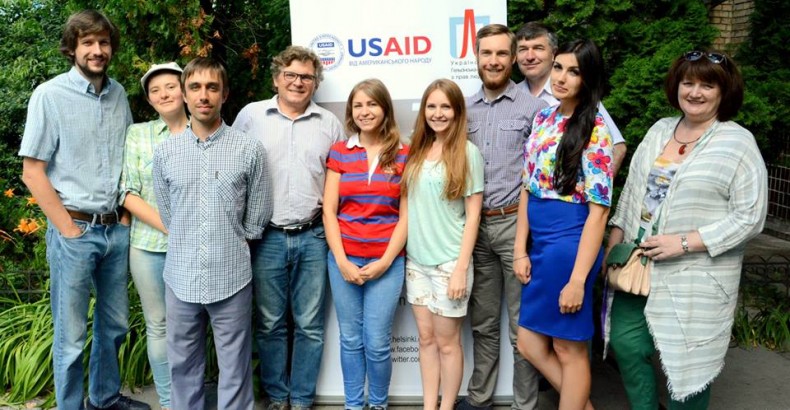
“People in their homes were dying from cold” – a nurse from Kharkiv
Interview by Taras Viychuk – I am 42 years old. I live and work in...
17 May 2022
02.06.2017
Gender expert Tamara Martseniuk continues to interview women working with the Ukrainian Helsinki Human Rights Union. Vitaliia Lebid, a lawyer of the Strategic Litigations Center, is the fifteenth interviewed within the series “Women Human Rights Defenders, Who Change Ukraine”.
Since November 2015, Vitaliia Lebid has been working as a lawyer of the Strategic Litigations Center of UHHRU. Since 2013, she has been teaching at the International and Comparative Law Department of Kyiv University of Law of the National Academy of Sciences of Ukraine. She has been writing her Ph.D. thesis on “The interaction of international non-governmental organizations with the United Nations in the field of human rights.” The author of a dozen of publications.
– Please share your history of involvement in the human rights movement in Ukraine. Why did you decide to work in this field?
– While still at university, I became interested in human rights, namely activities of the European Court of Human Rights. Reading the judgment of the European Court, I was struck by the deep philosophy of law, which is embedded in each of them, how individually judges approach to solving each case. These decisions were for me a model of justice. Therefore, when choosing a topic for research, I decided to study international human rights law without hesitations. As a result, I defended the master’s thesis on “The European Court of Human Rights concerning the right to fair trial”, and then began work on the Ph.D. thesis, which is also dedicated to human rights.
I felt myself a part of the human rights movement during the Revolution of Dignity. At the time, I was actively involved in various human rights initiatives. In November 2014, I became a volunteer of the UHHRU “Prisoners of War” project. The aim of the project was to liberate Ukrainian military from captivity and search for missing persons in the ATO zone by appealing to the European Court of Human Rights. Then I realized that in the future would be engaged in human rights activities. This decision was motivated primarily by the fact that I can and want to help people in their struggle for justice.

I clearly understood that human rights are not abstract concepts, mentioned in international documents, but an active living instrument in the hands of people, who intended to protect against arbitrariness of the state.
– Where have you got education and knowledge of human rights?
– I learned fundamentals of human rights at the Kyiv University of Law of NAS of Ukraine. During the training and after I participated in numerous workshops, seminars and conferences organized by UHHRU, OSCE, European Human Rights Advocacy Centre (EHRAC), and the Center for International Protection (Centre de la protection internationale). At these events, I had a unique opportunity to communicate and learn from the gurus of human rights, such as Volodymyr Butkevych, William Schabas, Anna Yudkivska, Karina Moskalenko, and Philip Leach. These events helped developing practical skills for strategic proceedings.
– What is your area of focus in the field of human rights?
– I worked with a wide range of issues related to human rights. I continue to explore different areas and subjects. I think that you should always strive to develop, broaden and deepen knowledge and skills.
I felt myself a part of human rights movement during the Revolution of Dignity.
I mainly work with the theme of human rights in psychiatry (access of legally incompetent persons to justice, illegal placing and retaining people in psychiatric institutions, right to alternative psychiatric examination, etc.), bringing to individual responsibility by decisions of the European Court of Human Rights.
– Did you work with the theme of women’s rights?
– Yes, I did. In my opinion, this is one of the most difficult types of cases. Very often women, who are victims of violence, are afraid to talk about it and afraid to fight for their rights. I have learned much during the seminar “Combating violence against women through the judicial protection”, conducted by the European Human Rights Advocacy Centre (EHRAC). The seminar was attended by representatives of various foreign NGOs that protect women’s rights. That’s when I realized how ambitious is the problem of violence against women and gender discrimination. Especially, this problem is acute for countries with the strong influence of religion and cultural traditions that produce the dominance of men over women.
Now I conduct a case in which a man tried to recognize his wife as mentally ill and illegally placed her in a psychiatric hospital. Our law enforcement agencies refuse to carry out the investigation, the criminal proceedings was closed, but we have achieved recovery of the investigation. However, the police still refuse to conduct investigations. Therefore, in the future, it is planned to appeal to the European Court.
– In your opinion, what are the greatest successes of the human rights movement in Ukraine?
– Now human rights movement is active as never. In recent years in Ukraine, there are many human rights initiatives, NGOs, human rights coalitions, monitoring groups, educational activities. This is an important achievement. Perhaps, the incentive was the Revolution of Dignity, which showed that the Ukrainian people are united in protecting their rights and freedoms. Moreover, the unity of the human rights movement allows monitoring all directions of government actions effectively.
– What are challenges of the modern human rights movement in Ukraine?
– First, weakness and slow pace of the implementation of vital reforms in the country. Although Ukraine has currently initiated much-needed changes, they have not been implemented properly. A striking example is the adoption of the National Human Rights Strategy, which is the first unified document with key areas of reform. Unfortunately, human rights defenders note that almost a half years passed after the approval of the Action Plan to implement the Strategy, but a lot of activities never been implemented.
It is necessary to improve quality of social and psychological work with victims of violence and efficiency of rehabilitation programs for men who commit violence or are at risk.
Secondly, these are low level of legal culture of law enforcement and judicial system. Still, judges adopt unlawful court rulings, and police refuse to investigate crimes. This disregard of the Convention for the Protection of Human Rights and Fundamental Freedoms, judgments of the European Court. That is why we continue to fight for human rights at the international level.
– In your opinion, is it enough attention paid to gender issue by the human rights movement?
– I find it difficult to evaluate objectively since I do not track all initiatives and gender issues, so I cannot talk about their effectiveness. I think, more attention is paid now than in previous years. It should be noted that there are human rights initiatives to attract public attention to the problem of violence against women and sexism: increasing social advertising, social media flash mobs #yaNeBoyusSkazaty ( I am not afraid to say), #HeForShe, #KonventsiyaUPodarunok (Convention as a present), actions to support ratification of the Council of Europe Convention on preventing and combating violence against women and domestic violence (Istanbul Convention).
As to whether sufficient attention is paid in general, the sufficiency in this context is difficult to measure. Perhaps, it will be sufficient, if our government hear the voice of human rights defenders and act in this direction. There is a need for ratification of the Istanbul Convention and for implementation of its provisions into national law, the adoption of the Labor Code of Ukraine to ensure equal opportunity in employment, raising legal awareness law enforcement on gender violence.

– Gender-based violence is a serious problem, particularly in Ukraine. In your opinion, what should be done to improve the situation?
– As I said earlier, this is amendments to national legislation in line with international standards. In addition, it is necessary to improve the quality of social and psychological work with victims of violence and the efficiency of rehabilitation programs for men who commit violence or are at risk, raising public awareness, measures to ban expressions of sexism in advertising. Also, I consider that it is important to include men in combating gender-based violence.
– What or who inspires you the most in your human rights work?
– I am inspired by, first of all, the hope for justice in the eyes of those who ask to me for the protection of their rights and, of course, the result of my work – to help people.
Prepared by Tamara Martseniuk
If you find an error on our site, please select the incorrect text and press ctrl-enter.

Interview by Taras Viychuk – I am 42 years old. I live and work in...
17 May 2022

The Kharkiv Human Rights Group (KHRG) is documenting international crimes (genocide, crimes against humanity, war...
14 April 2022

The Global initiative “Tribunal for Putin” invites to a closed online event “Kyiv region under...
12 April 2022

The Global initiative “Tribunal for Putin” invites to a closed online event “Kyiv region under...
12 April 2022